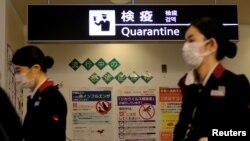Airlines made unprecedented cuts to flights, costs and staffing on Monday, and stepped up calls for emergency government aid, as coronavirus lockdowns and new travel restrictions hit more major routes.
Already battered shares in British Airways parent IAG , easyJet and Air France-KLM plunged again as they scrapped most of their flights for the coming weeks, joining other major carriers that are all but halting operations in the face of the pandemic.
"It is now clear that the coronavirus is by far the biggest crisis in the history of aviation," Finnair Chief Executive Topi Manner said as the carrier announced a 90% capacity reduction and its second profit warning in three weeks.
The outlook darkened further after Spain declared a state of emergency and the United States extended travel curbs to Britain and Ireland, while Australia and New Zealand began requiring all travellers to self-isolate.
In an unusual joint statement, the world's three main airline alliances - oneworld, SkyTeam and Star Alliance - called for government aid to alleviate the "unprecedented challenges" faced by the industry.
IAG, which also owns Spain's Iberia and Vueling, said it would cut April-May capacity by at least 75% and postpone CEO Willie Walsh's retirement - keeping successor Luis Gallego at Iberia's helm as the group navigates the crisis.
Besides cancelling flights, the group announced moves to freeze discretionary spending, reduce working hours and temporarily suspend employment contracts.
Low-cost rival easyJet said it would likely ground most of its fleet as it joined Virgin Atlantic in calling for government support.
"European aviation faces a precarious future, and it is clear that coordinated government backing will be required to ensure the industry survives," CEO Johan Lundgren said.
IAG's shares were down 21.3% at 1014 GMT, with Wizz Air down 19.5%, easyJet down 16.9% and Air France-KLM 16.8% lower.
"Airlines are siphoning cash and have no way of stopping it" as bookings grind to a halt and traffic collapses for six to eight weeks, Bernstein analyst Daniel Roeska said.
With many carriers now dependent on government help to survive, Roeska added, "the key focus should be on emergency liquidity support and enabling short-term layoffs or working-hour reductions to safeguard cash."
'Unprecedented'
IAG's Walsh, who has railed against state aid to rivals throughout his career, said airlines should continue to try self-help first.
But he added: "Clearly where governments are providing general support particularly for employees that are being impacted by the current crisis, we would avail (ourselves) of those general facilities."
Air France-KLM said it would park its entire Airbus A380 and Boeing 747 fleets as it reduces operations by 90% and discusses emergency aid with the French and Dutch governments.
The group will use government-funded partial layoffs to find 200 million euros ($224 million) in emergency cost cuts as it reins in capital expenditure by a further 350 million.
Airlines are likely to postpone new jet deliveries as they slash spending, a prospect weighing on Airbus, whose shares were down 16.7%, and Boeing. Aircraft and engine makers also face a slump in parts and maintenance sales as air traffic withers.
"Demand is drying up in ways that are completely unprecedented," aviation consultant CAPA said in a report, predicting that most global airlines would go bust by June without government help. "Normality is not yet on the horizon."
Germany's Tui AG and Scandinavian carrier SAS are also suspending the vast majority of operations and seeking government support.
Finnair predicted a substantial loss this year as it announced the near-halt of operations and scrapped its dividend. Icelandair also slashed capacity and said it was in union talks to cut its wage bill.
Earlier, United Airlines said March revenue had dropped by $1.5 billion and planes may remain near-empty into the summer even after severe schedule cuts. "This crisis is moving really quickly," CEO Oscar Munoz and President Scott Kirby told employees in a Sunday memo.
Air New Zealand Ltd, which has halted trading in its shares until Wednesday, also plans job cuts after cutting long-haul capacity by 85%, CEO Greg Foran warned.
"For the coming months at least, Air New Zealand will be a smaller airline requiring fewer resources, including people," he said.
($1 = 0.8933 euros)





